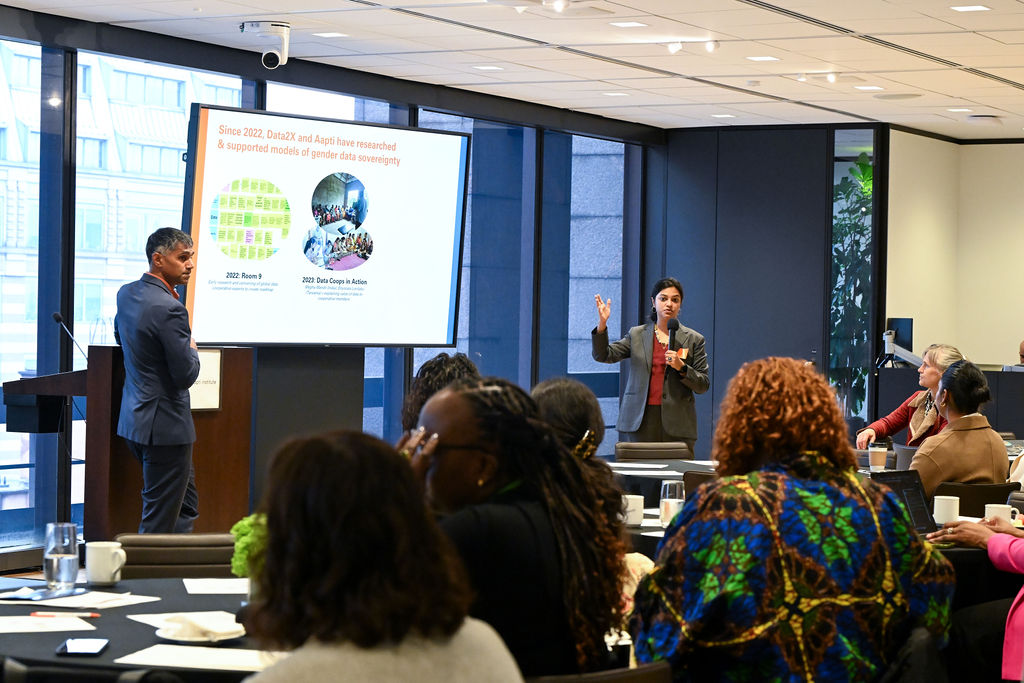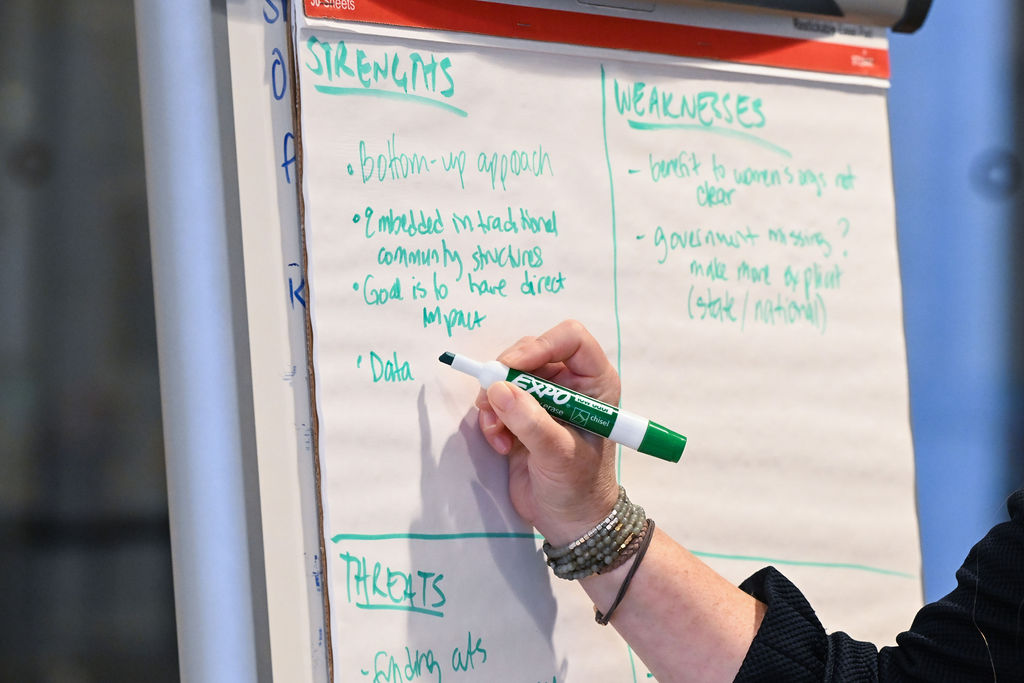
For over a decade, the climate dialogue has evolved in a manner that acknowledges that the environment is intricately linked to human health. This complex link between human health and the environment is known as planetary health. However, this concept is in its infancy, as much of this nexus has yet to be discovered. Indicators to assess planetary health are underdeveloped due to data gaps. Furthermore, significant data gaps exist concerning women’s experiences surrounding climate change and their contributions to climate action. The evolution of planetary health as a practice is a greater challenge, given the complex political climate where decades of research and momentum-building are being systematically dismantled. This is accompanied by the looming threat of undermining feminist policies.
As we are plunged into uncertainty, data cooperatives offer a glimmer of hope to navigate the shift in global priorities. Cooperatives are resilient organisational structures that hold power to mobilise communities around a shared set of values and interests. Globally, the cooperative movement has bolstered women’s participation in the labour market and has fostered a sense of agency through democratic decision-making within these groups.
Building on the resilience of cooperatives, Aapti Institute and Data2X propose CERES (Data Cooperatives for Ecosystem Research and Stewardship), a women-led community focused on planetary health. CERES would enable multiple stakeholder groups to interact meaningfully with one another using data as a resource.Data is a powerful tool for building communities because it is highly networked and has the effect of amplifying voices when pooled. Data cooperatives infuse equity and fairness into the data dialogue by placing communities at the centre of data governance. This implies that communities are empowered to make decisions surrounding their data—and, more importantly, can obtain benefits for making this data available to others, rather than the data sharing being extractive. Founded on these key pillars, CERES brings together policy-makers, researchers, technologists, and especially women’s groups who are at the frontline of the climate crisis to bridge the gap between the lived experiences of these communities and policy-making. This would be enabled through a technical layer that facilitates data collection and exchange, bolstered with a governance layer that would aid stakeholders in making decisions surrounding the data being collected and exchanged. These data flows juxtapose and balance varied stakeholder interests by channelling benefits in a reciprocal manner, detailed in the following figure:

By facilitating these exchanges, we envision CERES to enable the following:
- Capture and relay hyperlocal data and experiences
- Bring voices from the ground to the fore to build a global narrative on planetary health
- Evidence-based policy-making surrounding planetary health
- Sustaining the community through changing global political landscapes
On March 17, 2025, Aapti Institute and Data2X invited inputs from planetary health researchers, gender experts, climate researchers, and data sovereignty experts to assess the viability of CERES at a workshop organised along the sidelines of CSW69. Building on insights from our past work on data cooperatives, we held group discussions to break down the strengths, weaknesses, opportunities, and threats surrounding the proposition of CERES. The following are key points that emerged from these conversations:
Bottom-up data collection and governance
- With increased access to hyperlocal data, CERES would enable an evidence-based, systems approach to planetary health in which women’s interests are better represented through a bottom-up approach to climate action and data governance. Simply put, this approach would yield hyperlocal benefits to women while creating a global impact by connecting women at the frontlines of climate action to scientific research.
- It would encourage communities to own their data by making them central to the data collection process. At a macro level, this would decolonise climate action and data governance by empowering communities in the Global South.
- With multidimensional data being made available, there is an opportunity to build a nuanced understanding of climate data and consumer behaviour, carbon markets, and payments for ecosystem services, which are all currently at the forefront of the climate dialogue. From a technological standpoint, CERES could explore open infrastructures and protocols as models for collecting climate data globally.
Building solidarities around climate data
Since CERES is embedded in existing institutional structures, it leverages the trust and community surrounding these structures, making the process of building solidarities around planetary health smoother. However, in the absence of an existing network to tap into, implementing CERES is bound to be challenging, especially in reaching out to grassroots communities.
Complexities in navigating stakeholder roles
- CERES is driven by cooperation among multiple stakeholders rather than solely driven by those holding power. However, there is an apprehension that the agenda setting with respect to the data is likely to flow from governments and technology companies rather than the communities themselves. Relatedly, while CERES aims to bring marginalised communities to the forefront, traditional power dynamics can creep in, making it difficult for these communities to meaningfully exercise their agency.
- The role of the private sector remains unclear. This clarity is crucial to determining the actual degree of agency that communities will be able to exercise. A related concern is that completely excluding the use of any big tech services in the CERES interface is a challenge.
- Women’s roles need to be clearly defined in terms of their work. There is a likelihood that the work performed by women in preserving ecosystems could be treated akin to gig work, which brings with it a litany of concerning labour practices. This is problematic, especially in building artificial intelligence using this data.
Practical challenges
- Funding is the primary concern to address. The funding structure and for setting up and sustaining CERES are unclear. In the similar vein, the types of incentives for the various stakeholders have yet to be determined.
- The interaction of the multiple sectors in which CERES would operate needs to be determined and balanced effectively. This would entail drawing a boundary around how much technical knowledge and practice from each sector can be brought into CERES’ operation.
- For meaningful participation of communities, the following aspects are pre-requisites:
- Access to requisite digital infrastructure and building of digital and data literacy, especially for women
- Effective translation of existing knowledge systems, specifically traditional knowledge and purely qualitative knowledge on women’s lived experiences

These discussions shed light on some questions that need to be addressed as a first step to building CERES:
- How to navigate funding and incentives, which are central to the operation of CERES?
- Who will set the agenda for data collection and policy-making using the data?
- How do we bring stakeholders together to negotiate on priorities?
- Which networks are ideal to tap into so that there is equitable representation from all stakeholder groups?
- How do we bring in communities at the grassroots and integrate traditional knowledge systems most effectively?
- How can the technical layer be built to be equitable by design?
- How can CERES be scaled globally?
Armed with insights from the rich conversations in our workshop, as a next step to explore existing networks to build solidarity surrounding the values that CERES represents.
** Photography provided by Diane Bondareff


